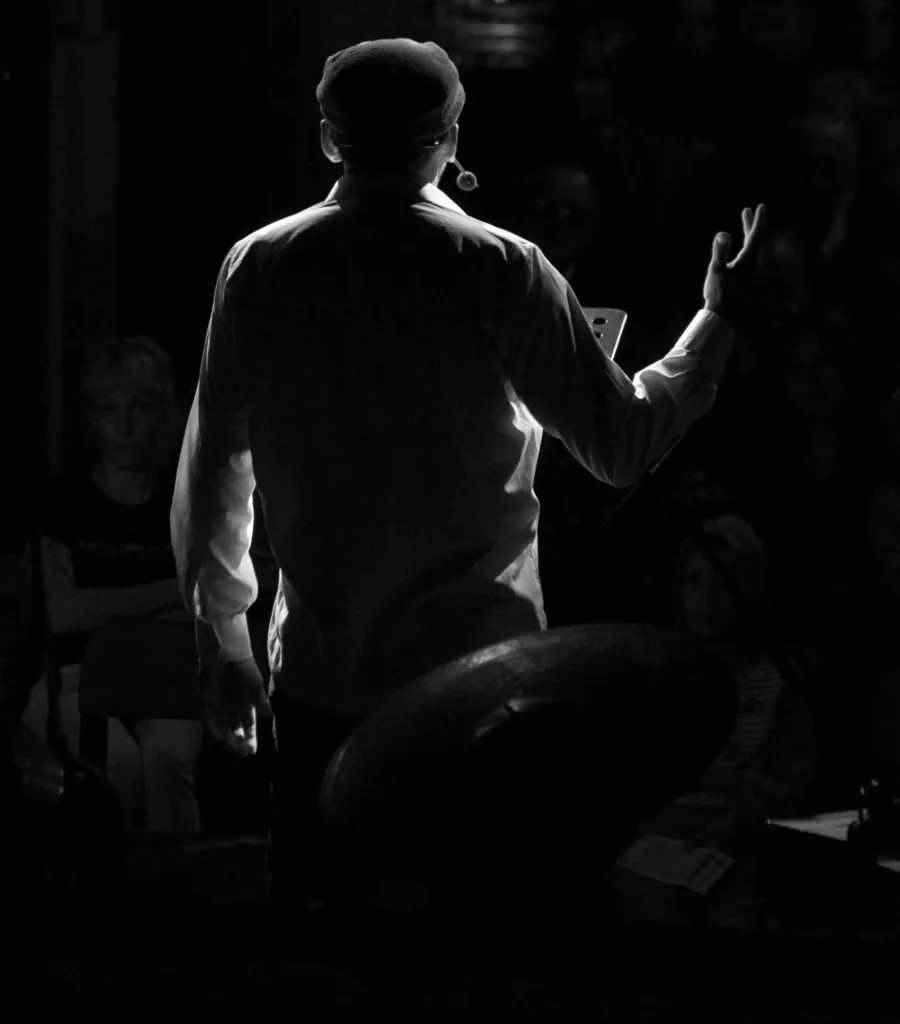When I stood up in front of my high school physics class to give a presentation on black holes, I was terrified.
I could feel the eyes of everyone in the room.
I could feel my heart racing.
When I started to speak, my first words came out in a stuttered jumble. (At that point, my stomach had become a literal black hole of its own!)
If you’re afraid you’ll never feel confident in your ability to communicate, I want you to remember that picture of me as an anxiety-stricken high school kid. It took me years and years and years to work on myself – to develop the confidence to speak now to audiences around the world. And if it’s possible for me as the shyest person in my high school, it’s also possible for you.
In this article I’d like to share my top 3 secrets for overcoming fear of public speaking, so that you can jumpstart your own journey to confident communication.
The Audience is Your Friend
When we speak, we think everyone in the audience – all those blank and bored faces – are silently judging us. And criticizing us.
After all that’s the first thing I felt in front of my physics class:
“I could feel the eyes of everyone in the room”
But think about the last presentation you attended. When you looked at the speaker, were you judging and criticizing them?
Probably not. You were probably hoping this was not going to be a waste of your time. You were probably hoping they were going to do a great job.
I want you to remember that. When you look at your audience, remember that they are rooting for you to succeed. Otherwise, why would they be there? And even if they seem “blank and bored”, consider the fact that’s how you also might look when you’re just listening.
There will always be at least one person in the room who does demonstrate their interest more explicitly. Seek that person out and make more eye contact with them. That way you remind yourself that, yes, the audience is on your side.
Check out this video where I explain more about this mindset shift:
Move Past Your Mistakes
Remember what happened to me when I did begin to speak:
“When I started to speak, my first words came out in a stuttered jumble”
If you go into a presentation thinking you’re got to be perfect, you’ve set yourself up for failure.
Because we will always make mistakes.
Instead of trying to avoid them at all costs, prepare yourself to expect them, and handle them when they occur.
For example, rather than shutting down and wincing as I did during my presentation, I should have just. Moved. On.
If you ever similarly trip over a word, or miss a part of your material, remember that no one will notice to any great degree except you. You and your success and your failures are the most important thing in the world in your own head. But everyone else is similarly thinking mostly just about themselves. Everyone will forget about your “mistake” in 5 minutes if you just move on gracefully.
For more tips on what to do if your mind suddenly goes blank, read more here. Or for more tips on what to say when you don’t know the answer, read more here.
Nerves vs Excitement
This last tip is one of the most important – because it helps you move from seeing the audience’s support and moving past your own mistakes, to feeling great about your own communication.
Remember this description from my nerve-wracking physics presentation:
“I could feel my heart racing”
I want you to think about the last time you felt your heart racing.
It could have been:
- At a big presentation in front of a lot of people
- Or looking down from a large height
- Or feeling the heat from the fire as your hand gets a bit too close to the stove
But it could also have been:
- Getting the job acceptance you really wanted
- Or seeing your parents after living for away for a long time
- Or preparing to go off on a wonderful vacation
Your heart races not just when you’re nervous, but also when you’re excited. They are two sides of the same coin. And the story you tell yourself in your head is the side you ultimately feel.
Rather than thinking of public speaking as this colossal, scary thing you have to either run away from or somehow conquer, what if you started to see it as an opportunity to show your expertise?
The audience, after all, asked you to speak because they support you. And the audience could care less about your “mistakes” because they’re focused on your success. The physical sensation of your heart racing could just be your body preparing you to step up to the plate and do something exciting, rather than something dreadful. It’s your mind. And you choose the story you tell yourself.
Summary
You are not alone in feeling afraid of public speaking. In fact, comedian Jerry Seinfeld said,
“According to most studies, people’s number one fear is public speaking. Number two is death. Death is number two. Does that sound right? This means to the average person, if you go to a funeral, you’re better off in the casket than doing the eulogy”
After this article I want you to remember the three ways you can differentiate yourself from the majority of the population:
1. The audience is your friend
2. Move past your mistakes
3. Nerves vs Excitement
Once you start to change the way you look at the audience, and above all yourself, the greater the changes you will notice to the confidence in your communication. Try it out and let me know how it goes!
If you’re looking for further guidance on how to speak with confidence and authority, reach out to me here.



